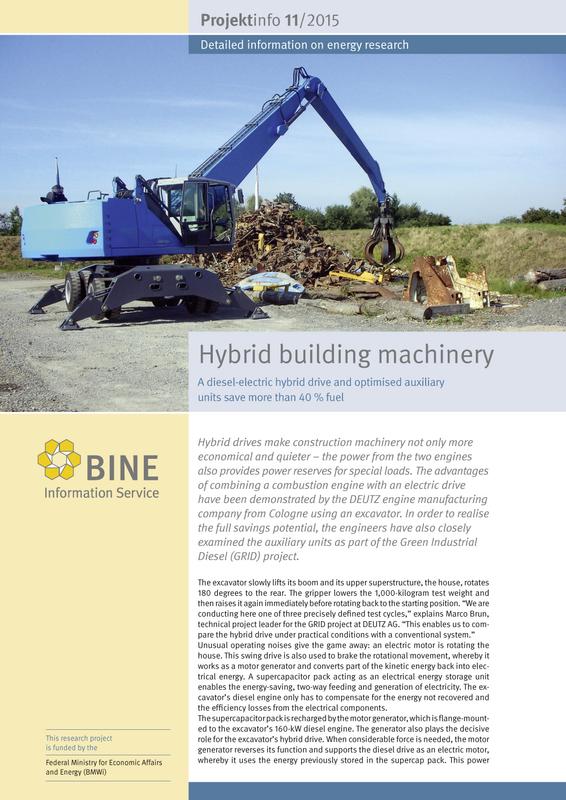Hybrid excavator uses diesel-electric drive

The BINE Projektinfo brochure “Hybrid building machinery” (11/2015) © BINE Informationsdienst
The new BINE Projektinfo brochure “Hybrid building machinery” (11/2015) presents a material handler with a diesel-electric drive. In order to supply the electric motor with electricity, part of the kinetic energy is converted via a generator into electricity and then stored in supercapacitors.
These and further optimisation measures enable the excavator to consume up to 40% less diesel while providing additional power reserves for special loads.
With the power of two motors
The rotary movements of the material handler’s upper superstructure, the house, are achieved via the electric motor’s drive and the energy released during braking is converted back into electricity. A generator flange-mounted to the 160-kW diesel engine charges the supercapacitors – the supercap pack.
The generator reverses its function as required, operating as a motor and supporting the diesel drive during peak loads. The supercap pack enables the two-way feeding and generation of electricity.
In contrast to lithium-ion batteries, which are used in cars, supercaps have the advantage that they have an extremely large number of cycles and a high charge and discharge efficiency.
With the test material handler, the interaction of the diesel engine, motor generator, energy storage system and the hybrid drive in the house was successful.
Another aspect of the research project was to optimise the auxiliary units. Demand-based configuration of the fans, pumps and alternator, as well as an adapted control system, enables up to 9% of the energy to be saved compared with standard units. The hybrid excavator is being developed as a joint project by Deutz AG, Robert-Bosch GmbH and Terex Deutschland GmbH.
The BINE-Projektinfo brochure “Hybrid building machinery” (11/2015) follow this link:
http://www.bine.info/en/press/press-releases/press/pressemitteilung/hybrid-bagge…
Uwe Milles/Birgit Schneider
presse(at)bine.info
About BINE Information Service
Energy research for practical applications
The BINE Information Service reports on energy research topics, such as new materials, systems and components, as well as innovative concepts and methods. The knowledge gained is incorporated into the implementation of new technologies in practice, because first-rate information provides a basis for pioneering decisions, whether in the planning of energy-optimised buildings, increasing the efficiency of industrial processes, or integrating renewable energy sources into existing systems.
About FIZ Karlsruhe
FIZ Karlsruhe – Leibniz Institute for Information Infrastructure is a not-for-profit organization with the public mission to make sci-tech information from all over the world publicly available and to provide related services in order to support the national and international transfer of knowledge and the promotion of innovation.
Our business areas:
• STN International – the world’s leading online service for research and patent information in science and technology
• KnowEsis – innovative eScience solutions to support the process of research in all its stages, and throughout all scientific disciplines
• Databases and Information Services – Databases and science portals in mathematics, computer science, crystallography, chemistry, and energy technology
FIZ Karlsruhe is a member of the Leibniz Association (WGL) which consists of 87 German research and infrastructure institutions.
http://www.bine.info/en – BINE Informationsdienst
Media Contact
All latest news from the category: Power and Electrical Engineering
This topic covers issues related to energy generation, conversion, transportation and consumption and how the industry is addressing the challenge of energy efficiency in general.
innovations-report provides in-depth and informative reports and articles on subjects ranging from wind energy, fuel cell technology, solar energy, geothermal energy, petroleum, gas, nuclear engineering, alternative energy and energy efficiency to fusion, hydrogen and superconductor technologies.
Newest articles

Security vulnerability in browser interface
… allows computer access via graphics card. Researchers at Graz University of Technology were successful with three different side-channel attacks on graphics cards via the WebGPU browser interface. The attacks…

A closer look at mechanochemistry
Ferdi Schüth and his team at the Max Planck Institut für Kohlenforschung in Mülheim/Germany have been studying the phenomena of mechanochemistry for several years. But what actually happens at the…

Severe Vulnerabilities Discovered in Software to Protect Internet Routing
A research team from the National Research Center for Applied Cybersecurity ATHENE led by Prof. Dr. Haya Schulmann has uncovered 18 vulnerabilities in crucial software components of Resource Public Key…





















